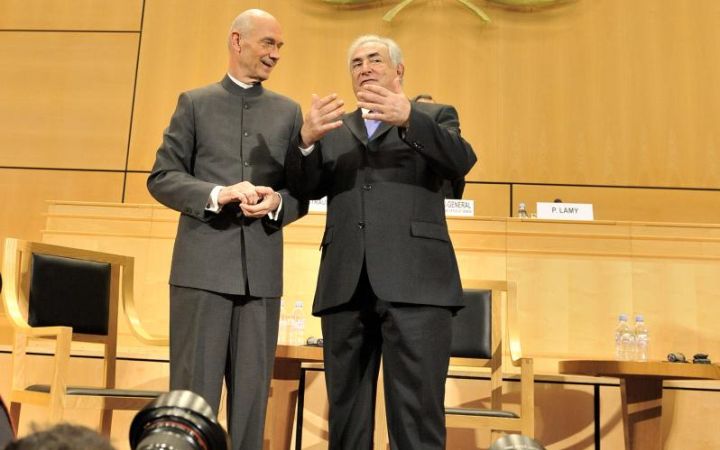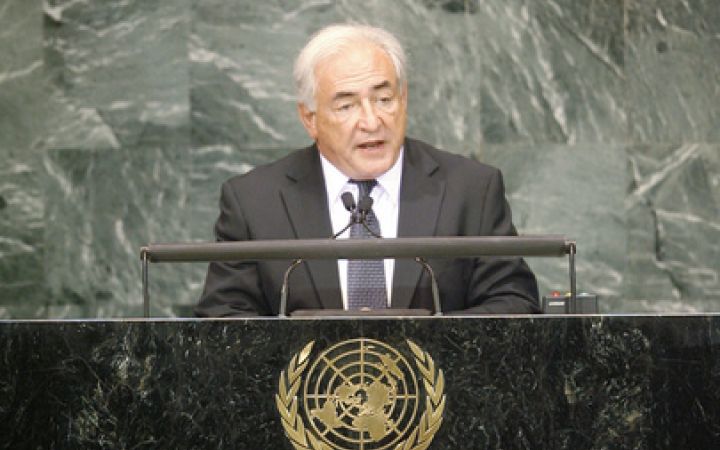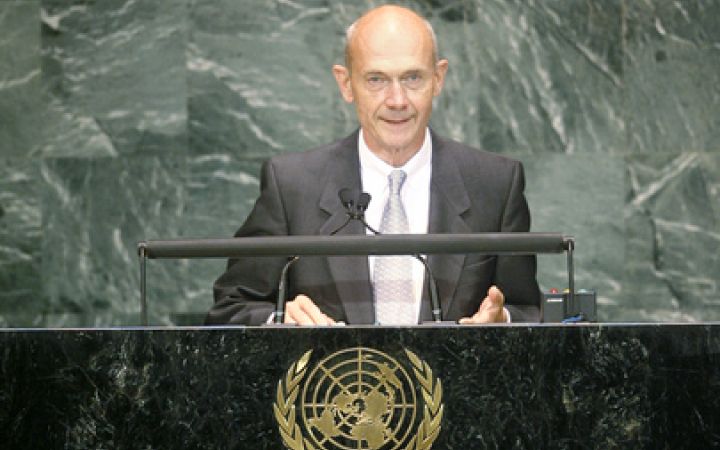Public conference
Keynote speakers of the 6th edition of the Geneva Lecture Series jointly organized by UNOG and UNITAR, Heads of the IMF and WTO Dominique Strauss-Kahn and Pascal Lamy discussed the implications and lessons of the financial crisis for global economic growth and economic and financial governance models. The conference that took place at Palais des Nations in Geneva, on 8 December 2010, followed the usual format of the initiative - an interactive debate with journalists and the general public following the keynote addresses - and attracted up to 2000 people in attendance. The Lecture entitled “The impact of the financial crisis on global economic governance” was broadcast live via Internet as well as via a videoconference link to UNHQ in New York where Ambassador U. Joy Ogwu led the group of 100 participants.
Mr. Strauss-Kahn's speech (PDF, 30 kb)
Mr. Lamy's speech (PDF, 114 kb)
Video archive of the Lecture in English
Speaking of a “triple return” of global economic governance and the Organization he is currently leading, the IMF, Mr. Strauss-Kahn noted on the occasion of the lecture, “the world has changed... Growth in emerging and developing economies redefined the balance of power. The crisis has swept away the old economic order. Today, the effects of the crisis are far from over. The situation in Europe remains troubling, and the future is more uncertain than ever today. We must nonetheless begin, without waiting for calm to be restored, to rebuild, to start again with the structures established after the Second World War”.
Outlining the choice facing the international community, Mr. Strauss-Kahn said we could choose “a new growth model different from the one before the crisis that has shown its limits, or the international community can choose inertia, fall back on national positions, national solutions, and risk years of instability, the breeding ground for another crisis. If the choice is made for a new growth model then it requires a new model of governance and it requires the recognition that enterprises have become global planet wide, and therefore, public expression, the force of democracy, the will of people, must also be translated into on a global scale and that’s where the global economic and financial governance comes in”.
The WTO Director General, Mr. Lamy, in his turn, pointed out, “this crisis stems from the growing disruptions to the order established in the aftermath of the Second World War. But I also think that it provides us with an opportunity to restore some kind of coherence in global economic governance”.
The debate moderated by Darius Rochebin, TSR evening news anchor, consisted of questions of the audiences of the media partners of the initiative, Télévision Suisse Romande, Radio Suisse Romande, and Tribune de Genève, as well as questions from the public present in the Assembly Hall of the Palais des Nations. It has covered, among other, the issues linked to the need for effective financial regulation, supervision and crisis resolution mechanisms, the debt crisis in Europe and the future of the Eurozone, shortage in trade finance in developing countries, and trade negotiations.
Dominique Strauss-Kahn
Dominique Strauss-Kahn is currently Managing Director of the IMF. His distinguished carerr includes service as Minister of Economy, Finance and Industry of France during the launch of the Euro, as well as Minister of Industry and International Trade, during the Uruguay Round. Mr. Strauss-Kahn was several times elected to the National Assembly, taught economics at the Paris Institute of Political Studies and Stanford University, and worked as personal advisor to the Secretary General of the OECD. In 2006, Mr. Strauss-Kahn ran for the Socialist Party's nomination for the French presidential election.
Read Mr. Strauss-Kahn’s biography on the IMF website.
Pascal Lamy
Pascal Lamy was appointed WTO Director-General in 2005. Previously, Mr. Lamy served as Commissioner for Trade at the European Commission under Romano Prodi. In addition, he had been CEO of the Credit Lyonnais before its privatization, and served as associate Professor at the Paris Institute of Political Studies and as advisor to Mr. Poul Nyrup Rasmussen, President of the European Socialist Party. Earlier in his career, he also worked as advisor to the Finance Minister, and subsequently to Prime Minister of France. Mr. Lamy was Chief of staff for the President of the European Commission, Jacques Delors.
Read Mr. Pascal Lamy's biogrpahy on the WTO website.
Resources
Financial governance
- G20 and reform of Bretton Woods Institutions
- Bretton Woods Institutions
- Articles of Agreement of the International Monetary Fund
- IMF Board Approves Far-Reaching Governance Reforms. Press release from 5 November 2010 and other documents on IMF website
Economic and trade governance
- The Uruguay Round agreements
- Doha Development Agenda: Negotiations, implementation and development
- UNCTAD
The financial crisis and economic theory
The financial crisis and economic governance
- Robert Zoellick "Op-ed: The G20 must look beyond Bretton Woods" in FT, 8 November 2010
- Joseph Stiglitz "Taming Finance in an Age of Austerity" in Project Syndicate, July 2010
- IMF Staff Position Note SPN/10/15: Shaping the New Financial System, by José Viñals, Jonathan Fiechter, Ceyla Pazarbasioglu, Laura Kodres,Aditya Narain, and Marina Moretti, 3 October 2010
- Raghuram Rajan "Beggaring the World Economy" in Project Syndicate, October 2010
DISCLAIMER
The responsibility for opinions in the documents cited on this page rests solely with their authors. The citation of these documents does not constitute an endorsement by the United Nations Institute for Training and Research neither by the organizers or sponsors of the Geneva Lecture Series.
What the media say
Media partners' coverage
- Tribune de Genève: Euro is not in danger, 8 December 2010
- Radio Suisse Romande: "Euro is not in danger", interview with Dominique Strauss-Kahn, excerpts by Francesca Argiroffo | 01:17 min. | 09 December 2010
- Radio Suisse Romande: "The situation remains troubling in Europe", interview with Pascal Lamy, excerpts by Francesca Argiroffo | 01:09 min. | 09 December 2010
- Tribune de Genève: Dominique Strauss Kahn is coming to Geneva to take part in a debate, 14 November 2010
- Tribune de Genève: Dominique Strauss Kahn is coming to Geneva to take part in a debate, by A. Jourdan, 18 November 2010
- Radio Suisse Romande
- TSR Interview with Dominique Strauss-Kahn by Darius Rochebin, 23 November 2010
- TSR Video portrait of Mr. Strauss-Kahn and Mr. Lamy
Post-event media coverage by other media outlets
- France 5 Dominique Strauss-Kahn's Mystery, 9 December 2010 (part from 30.30 min to 34.00)
- Businessweek Strauss-Kahn Says Euro Will Still Be There Five Years From Now, by Jennifer Friedman, 8 December 2010
- Reuters IMF chief: European situation remains troubling, by Laura MacInnis, 8 December 2010
- Le Monde The situation in Europe remains troubling, says Dominique Strauss-Kahn, by Lemonde.fr and AFT, 8 December 2010
- MoneyWeek Dominique Strauss-Kahn is worried by the situation in Europe, by Robin Bleeker, 8 December 2010
- Le Temps – The Polish plumber syndrome paralyzes the European continent, by Ram Etwareea, 8 December 2010
- TV5 Europeans continue to be divided over responses to the crisis, 8 December 2010
- News.com.au Europe's future 'more uncertain than ever', says IMF chief, From correspondents in Geneva, From: AFP, December 09, 2010
- EUBusiness IMF chief says situation in Europe still 'troubling', 08 December 2010, AFP
- AbcNews IMF Chief: European Situation Remains Troubling, By Laura MacInnis,December 8, 2010
- EUROPOLITICS Strauss-Kahn: Euro not in danger despite crisis, Wednesday 08 December 2010
- Buenos Aires Herald IMF chief: European situation remains troubling, by Laura MacInnis, AFP, 8 December 2010
- The Times of India IMF chief says situation in Europe still 'troubling' , by Laura MacInnis, 8 Dec, 2010, AFP
- Vietnam Daily News IMF chief says situation in Europe still 'troubling', by Laura MacInnis, 8 Dec, 2010, (AFP)
- DOW JONES NEWSWIRES IMF Chief: Rebuilding Global Governance Structures Vital To Future Growth, Stability, By Ian Talley, 8 December 2010
- Terra The European situation remains troubling, by Laura MacInnis, 8 Dec, 2010, (AFP)
- Washington Post U.S., European policies diverge, By Howard Schneider, December 8, 2010
Other media outlets




